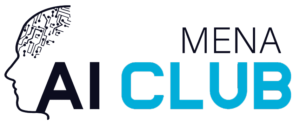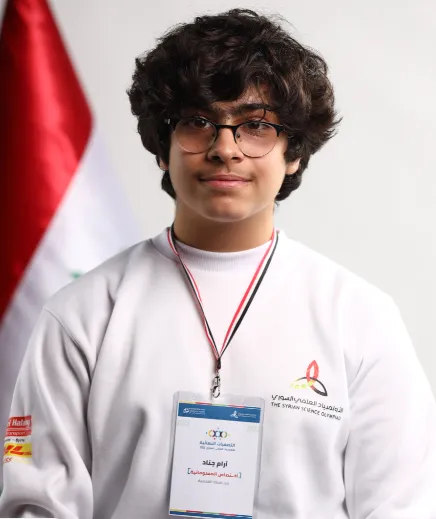

The UNESCO AI and Education Forum brings together over 100 speakers and government representatives to discuss the role of artificial intelligence in education. What sets their 2019 forum apart is the presence of Shahed Dergham as the youngest speaker, sharing her achievements, hopes and dreams for future and those of her team from the Ada Lovelace Hackathon 2021.
We at AI Club MENA take pride in the impact our girls have made, all within just one year of our commitment to supporting girls in learning technology and striving towards their dreams.
The following is a Q&A with Shahed.
Can you briefly describe what the Hackathon was about and what was the topic chosen?
Girls in AI hackathon served as a dynamic platform for me and my team to elevate their expertise in artificial intelligence while fostering innovative thinking to tackle pressing sustainability challenges. We each specialized in a distinct facet of sustainable development. It encompassed hands-on workshops and insightful lectures, leveraging the power of artificial intelligence to devise ingenious solutions for real-world issues and optimize operational processes.
The chosen topic for the 2021 edition of the Hackathon revolved around two themes: climate action and life on land.
What inspired you to participate in this Hackathon?
The hackathon provided a unique opportunity for me to explore technology, artificial intelligence, and design, aiming to expand my knowledge and gain practical experience. It opened up new horizons in a field that’s increasingly relevant in our tech-driven society, inviting those genuinely interested in these advancements to engage and thrive.
Can you tell us about the project you worked on during the Hackathon and the problem it aimed to solve?
DEREVe aims to raise environmental awareness and encourage people to recycle. It provides simple and creative ways to make use of discarded items while promoting sustainable development and preserving the environment. We shed light on the issue of environmental pollution, whether it’s in water, air, soil, or any other form. Additionally, we addressed the unsightly appearance of waste in streets, forests, and parks, aiming to find solutions to these problems.

How did you and your team come up with the project idea?
Our team fostered collaboration, energetically exploring ideas, analyzing strengths and weaknesses, and focusing on the ever-present issue of pollution. This led to a brainstorming session where we discovered the inspiring potential of recycling as a remedy for this pressing problem

What were your specific responsibilities within the Hackathon? Can you describe your experience presenting your project to industry experts? How did you prepare for it, and what helped you learn?
Team responsibilities weren’t delineated in a rigid manner, as emphasized earlier; our approach thrived on seamless collaboration, with each of the five team members actively contributing ideas to present our project optimally. Nevertheless, my primary focus encompassed entrepreneurship and public relations, entailing the cultivation of potential collaborations with external companies.
Presenting our project to industry experts was an exhilarating yet demanding endeavor. To equip ourselves, we undertook exhaustive research, delving into the project’s technical intricacies, environmental ramifications, and potential market value. We meticulously rehearsed our presentation multiple times to ensure that we could adeptly convey our vision and ideas to the experts.

Our preparation was further enriched by harnessing the collective expertise and competencies within our team, supplemented by the invaluable guidance and resources provided by the Hackathon organizers. This experience proved to be a pivotal learning opportunity, not solely about our project but also underscored the paramount importance of effective communication and presentation prowess within the industry.
What feedback did you receive from the experts, and how did it help improve your project?
Presenting our project to experts and industry leaders was not only a formidable challenge but also a vital milestone. Effectively conveying our project’s idea, purpose, and goals to these seasoned professionals was paramount, as their feedback and insights were invaluable for refining our work. Standing before such passionate individuals and sharing the collective efforts of our team in making the project a success was an incredibly gratifying experience.
Our preparation spanned an extended period and demanded exhaustive efforts to comprehensively address all aspects we intended to discuss and explore every possible scenario. Testing the interest and engagement of these experts served as a potent motivator, spurring us to strive for excellence. Simultaneously, we actively sought potential support, be it for execution, funding, or even the adoption of our innovative idea.

The foundation of our learning journey was rooted in unwavering passion, boundless ambition, and resolute determination. Armed with the right methodologies and approaches, we embraced self-directed learning and assumed responsibility at every step. Analytical thinking and proactive problem-solving proved to be the linchpin skills during the Hackathon, attributing much of our success to the effectiveness of our chosen methods.
The primary message I sought to convey through my participation revolved around championing not only our project but also similar initiatives. I aimed to inspire improvements in global living conditions, forging a path toward a secure and sustainable future for generations to come. Additionally, I aimed to underscore the remarkable creative potential of Syrian minds, despite the constraints of limited resources, highlighting their capacity for innovation and hard work as instrumental in achieving sustainability. My aspiration is that they receive the essential support and recognition from the United Nations and the wider world community.

Can you share your experience of delivering a speech at the United Nations conference? What was the main message you wanted to convey, and how did you get this opportunity?
This experience has had a profoundly positive impact on my life, igniting a fervent motivation to persist on this path, hone the skills I’ve acquired, and explore even greater horizons. Committed to self-improvement, I proactively sought out courses in graphic design and web development, with future plans to enroll in online programs focused on entrepreneurship and business. My overarching objective is to embark on ambitious projects and potentially initiate new ventures that encompass a spectrum of my interests.
The genesis of this opportunity materialized following our team’s triumphant victory as global Hackathon champions. “Teens in AI,” the organization behind the Hackathon, extended the invitation to the five team members, seeking a representative to partake in the United Nations conference. I was privileged to be chosen as the ambassador to represent our team at this prestigious event.
How did winning the Hackathon and delivering your speech at the United Nations conference impact your professional life or personal growth? What are your future plans? Will you participate in more Hackathons or similar events?
Every opportunity aimed at cultivating entrepreneurship and technology skills holds immense significance for personal development and professional advancement. These opportunities serve as gateways to a fulfilling life, financial stability, and captivating projects that enrich one’s career, while also unlocking access to extraordinary international prospects. I wholeheartedly advocate for the pursuit of knowledge and skills acquisition, active participation in seminars, and the unleashed creativity to craft novel and distinctive solutions.
What advice would you like to give to teenage girls interested in entrepreneurship and technology in the future?
I strongly encourage young individuals to immerse themselves in the realm of digital technology, for our society is perpetually evolving, with an ever-growing digitization permeating every facet of our lives.
Any final notes?
Artificial intelligence stands as a cornerstone, pivotal in augmenting efficiency, conserving time and energy, facilitating informed decision-making, and elevating customer experiences through personalized services catering to individual needs. Its profound impact reverberates across critical domains like medicine, security, and industrial advancement, underscoring its paramount significance.


